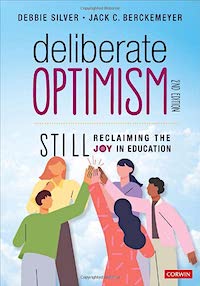Reclaim the Joy in Education This Fall
Deliberate Optimism: Still Reclaiming the Joy in Education, 2nd ed.
By Debbie Silver and Jack C. Berckemeyer
(Corwin, 2023 – Learn more)
Reviewed by Sarah Cooper

Rather, in Deliberate Optimism: Still Reclaiming the Joy in Education, Debbie Silver and Jack C. Berckemeyer insist that “now more than ever teachers and leaders must acknowledge and seek to resolve the unsustainable stress levels on all those connected with schooling.” And, in the course of the book, they give hundreds of immediately implementable suggestions for making each day better for you and those you walk the halls with – students, teachers and admins alike.

In addition, the end of each chapter pulls together ten discussion questions for teachers, such as “Outside the classroom, how do you continue to act as an advocate for your students?” and 10 action steps for school leaders, such as “Sit in the back of a classroom and imagine what it would be like to teach the students in that room… Think about what you are asking your teachers to do. Is it fair and reasonable? Would you be able to do what you are asking them to do?”
If a lot of this sounds like common sense, it is. However, the power of this supportive, no-nonsense book arises in putting all of these suggestions together in a way that will make you feel like I could use this tomorrow with my colleague, my students or myself to make the day better – and remember why you became a teacher in the first place.
Find your way in
You could read this book front to back, starting with the “Four Principles of Deliberate Optimism for Educators,” which are 1) gather information, 2) control what you can, 3) do something positive, 4) own your part.
You could also treat Deliberate Optimism like a series of recipes or daily inspirations, dipping in a few pages at a time, because the table of contents is so detailed. Below the chapter headings are subheads such as “Writing Letters to Students” under Principle 3 and “What Can You Live With?” under Principle 7.
Introduction: Choosing to Enter Education Is a Telling Vote for Optimism
• Principle 1: Gather Information
• Principle 2: Control What You Can
• Principle 3: Do Something Positive
• Principle 4: Own Your Part
• Principle 5: Mental Health Is Health
• Principle 6: “But We Have This One Teacher Who Keeps Ruining Everything!”
• Principle 7: Building a Positive Shared School Community
• Principle 8: Joyful School Communities: The Sum of Their Parts
Deliberate Optimism is also eminently practical. Just three pages into the chapter on mental health, for instance, you’re offered a three-point script for how to say “no” to a request you don’t have time for, a reminder to “pay attention to your life outside your job” as one of four additional ways to foster mental health, and a link to a video reminding us: “Before you open the door, smile.”
So many Immediately Inspiring Ideas
Looking toward the new school year, some elements I want to try are to consider student-led conferences (SLCs) for a joyful school culture, to inject more fun into staff meetings, to create a sense of collective efficacy whenever I can as a teacher and administrator, and to simply take some positive action even on days when this is hard to do.
As the authors note, “the best way we can revive our spirits is to focus on something we can control and deliberately enact steps to empower ourselves toward that end” – something as small as (the book quotes Barbara Blackburn suggesting), “Find your quietest students and ask about their days.”
Another point I really appreciated to build connection was the reminder that, with parents, “What is missing is not communication; it’s conversation… We pour information out over them like a reservoir spillway…. One ten- or fifteen-minute conversation can make all the difference,” even in an informal setting like car line.
What I will take away most from Deliberate Optimism is its consistent and humorous encouragement that’s tempered by the reality of working in schools today. It’s worth picking up, setting down and picking up again in the throes of a difficult month or semester, looking for a piece of wisdom from people who get it – who get us.
Find MiddleWeb articles by Debbie Silver here and by Jack Berckemeyer here and here.
Sarah Cooper teaches eighth-grade U.S. History and is Associate Head of School at Flintridge Prep in La Canada, California, where she has also taught English Language Arts. Sarah is the author of Making History Mine (Stenhouse, 2009) and Creating Citizens: Teaching Civics and Current Events in the History Classroom (Routledge, 2017). She presents at conferences and writes for a variety of educational sites. You can find all of Sarah’s writing at sarahjcooper.com.


































Sarah, thanks so much for your wonderful review of our new book! You have captured its essence with your thoughtful, thorough review. We appreciate you taking the time to read, reflect on, and share your thoughts with Middle Web readers. We hope you have your best school year ever!! Keep choosing optimism!!